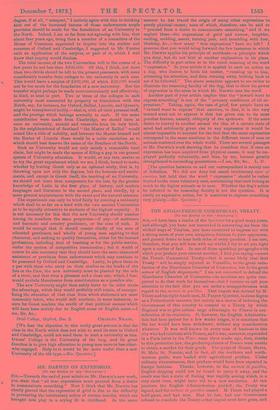MR. DARWIN ON EXPRESSION.
(TO THE Ear= OF THE "SPECTATOR:1
SIR,—Towards the end of your article on Mr. Darwin's new work, you state that "all true expressions must proceed from a desire to communicate something." Now I think that Mr. Darwin has clearly proved that the expression of grief is due to the difficulty in preventing the involuntary action of certain muscles, which are brought into play in a crying fit in childhood. In the same
manner he has traced the origin of many other expressions to purely physical causes ; none of which, therefore, can be said to "proceed from a desire to communicate something," and if we neglect these—the expressions of grief and sorrow, laughter, smiling, nodding, assent, taming pale, and trembling with fear, blushing, &c.,—how many "true expressions" have we left ? I presume that you would bring forward the few instances in which Mr. Darwin applies his principle of antithesis—a principle which you deny, but do not hint at another explanation in its place. The difficulty in part arises as to the exact meaning of the word "expression." In your article it is applied to such an action as a dog, who desires to fetch his master, "running up to him, attracting his attention, and then running away, looking back to see if he followed." The above anecdote appears to me rather to illustrate the reasoning faculty of the dog, that to show his power of expression in the sense in which Mr. Darwin uses the word.
Another part of your article implies that the "inward want to express something" is one of the "primary conditions of all ex- pressions." Taking, again, the case of grief, few people have an "inward want to express" that emotion, in fact, it is the very inward want not to express it that has given rise to its most peculiar feature, namely, obliquity of the eyebrows. If the mere desire to convey to another animal the idea of a certain state of mind had arbitrarily given rise to any expression it would be almost impossible to account for the fact that the same expressions correspond to the same emotions in the different races of man or animals scattered over the whole world. There are several passages in Mr. Darwin's work showing that he considers that if once an expression has been acquired from physical causes, it may be em- ployed perfectly voluntarily, and thus, by use, become greatly strengthened in succeeding generations.—I am, Sir, &c., L. D.
[The question between us and our correspondent is mainly one of definition. We did not deny but assert involuntary signs of emotion, but held that the word " expression " should be rather limited to the more voluntary ones, maintaining that such belong as much to the higher animals as to men. Whether the dog's action be referred to its reasoning faculty is not the question. It is surely an expressive action, for it contrives to express something very p]ainly.—En. Spectator.]


































 Previous page
Previous page